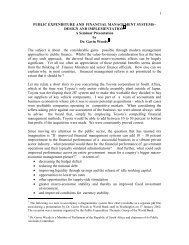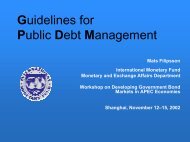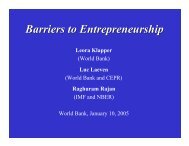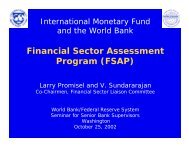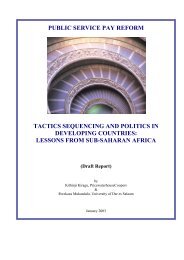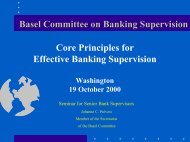CORRUPTION ASSESSMENT: MOZAMBIQUE - World Bank
CORRUPTION ASSESSMENT: MOZAMBIQUE - World Bank
CORRUPTION ASSESSMENT: MOZAMBIQUE - World Bank
You also want an ePaper? Increase the reach of your titles
YUMPU automatically turns print PDFs into web optimized ePapers that Google loves.
6.2 Public ProcurementMozambique has yet to develop a comprehensive public procurement system andoversight mechanisms for procurements. Procurements are decentralized to lineministries, some of which have better structures in place than others for protecting thepublic interest. However, even the best systems, as in the procurement of drugs andmedical supplies, have some critical structural flaws (discussed separately in the healthsection of this report). Both grand and petty corruption in the procurement process aremajor problems. Procurement reform legislation has been drafted with assistance fromthe <strong>World</strong> <strong>Bank</strong>, but it contains important flaws that would effectively limit transparencyand oversight of procurement by civil society.Institutional setting and procurement practicesDonors, for the most part, require goods and services to be procured following their ownguidelines and under close supervision. At times, they procure the goods and servicesthemselves. As a result, Mozambique has hardly developed a public procurement systemof its own. Existing practices, to the extent that they have not fallen under the purview ofprocurement guidelines of donors, have tended to rely excessively on discretionary (andchanging) powers of the public sector, making the process easy prey of corruption andinefficiencies.The issues: constraints and incentivesGiven these circumstances, Mozambique has very limited experience with a modern andsystematic procurement system. This has fostered a symbiotic and often corruptrelationship between the authorities and segments of the business sector in the award ofcontracts. Because of the breadth and complexity of procurements, there are many formsof fraud and corruption. Some of the most common corruption schemes are: bribes andkickbacks, conflicts of interests, collusive bidding, bid rigging, false statements andclaims, avoiding competition requirements, manipulation of bidding process by publicofficials, false or duplicate invoices by contractors, failure to meet contract specifications,and purchases for personal use or resale. The small size of the local business communityhas, if anything, facilitated the practice of collusion and has limited real competition thatwould otherwise help to discipline procurement practices and associated decisionmaking.To overcome these problems and protect the limited public procurement system that iscurrently in place, the government has prepared, in consultation with the private sector,draft legislation to regulate public sector procurement. The legislation establishes detailedprocedures designed to limit subjectivity and decrease the opportunity for abuse ofdiscretion in the procurement process. Its decentralized approach is potentially viable andeffective, however it has some critical failings that have the potential to undermine it (seebelow). Even if the rules and procedures in the regulations were perfected, this would notguarantee a successful and effective procurement reform.FINAL REPORT 32


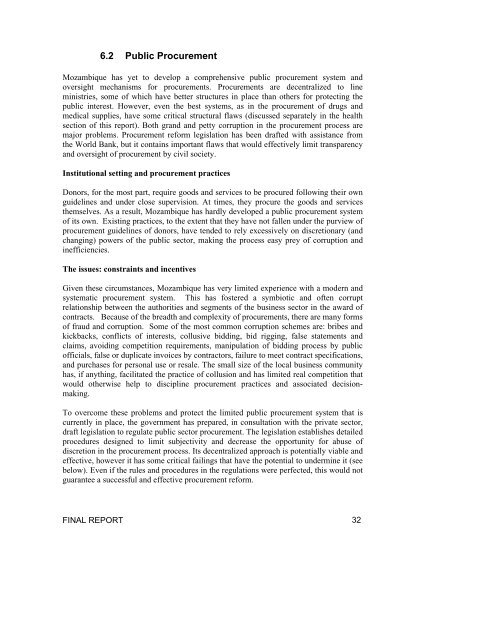
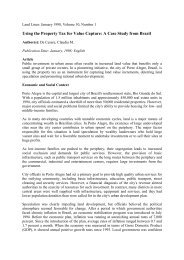

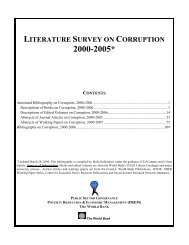
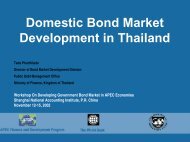
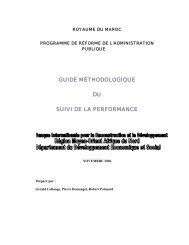
![Budget Execution: Overview [PDF 453K]; Bill Dorotinsky - World Bank](https://img.yumpu.com/47844909/1/190x143/budget-execution-overview-pdf-453k-bill-dorotinsky-world-bank.jpg?quality=85)
